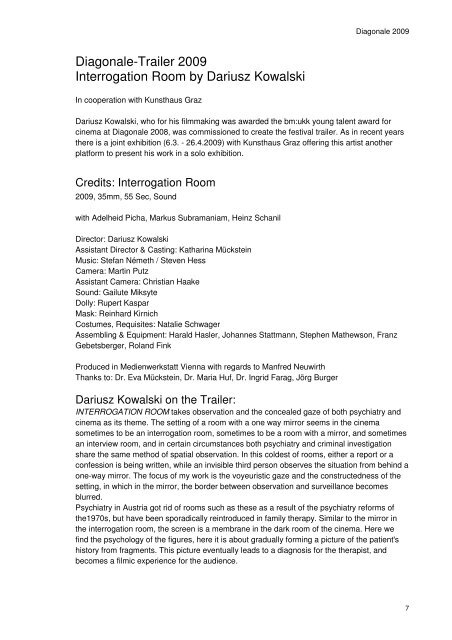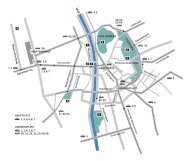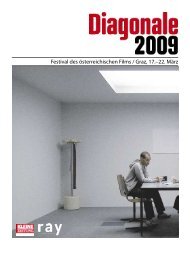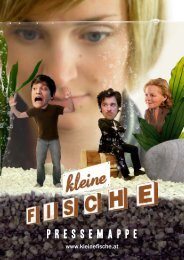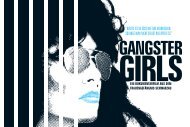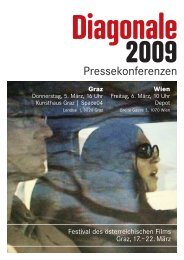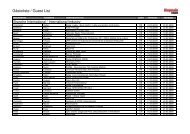You also want an ePaper? Increase the reach of your titles
YUMPU automatically turns print PDFs into web optimized ePapers that Google loves.
Diagonale-Trailer <strong>2009</strong><br />
Interrogation Room by Dariusz Kowalski<br />
In cooperation with Kunsthaus Graz<br />
Diagonale <strong>2009</strong><br />
Dariusz Kowalski, who for his filmmaking was awarded the bm:ukk young talent award for<br />
cinema at Diagonale 2008, was commissioned to create the festival trailer. As in recent years<br />
there is a joint exhibition (6.3. - 26.4.<strong>2009</strong>) with Kunsthaus Graz offering this artist another<br />
platform to present his work in a solo exhibition.<br />
Credits: Interrogation Room<br />
<strong>2009</strong>, 35mm, 55 Sec, Sound<br />
with Adelheid Picha, Markus Subramaniam, Heinz Schanil<br />
Director: Dariusz Kowalski<br />
Assistant Director & Casting: Katharina Mückstein<br />
Music: Stefan Németh / Steven Hess<br />
Camera: Martin Putz<br />
Assistant Camera: Christian Haake<br />
Sound: Gailute Miksyte<br />
Dolly: Rupert Kaspar<br />
Mask: Reinhard Kirnich<br />
Costumes, Requisites: Natalie Schwager<br />
Assembling & Equipment: Harald Hasler, Johannes Stattmann, Stephen Mathewson, Franz<br />
Gebetsberger, Roland Fink<br />
Produced in Medienwerkstatt Vienna with regards to Manfred Neuwirth<br />
Thanks to: Dr. Eva Mückstein, Dr. Maria Huf, Dr. Ingrid Farag, Jörg Burger<br />
Dariusz Kowalski on the Trailer:<br />
INTERROGATION ROOM takes observation and the concealed gaze of both psychiatry and<br />
cinema as its theme. The setting of a room with a one way mirror seems in the cinema<br />
sometimes to be an interrogation room, sometimes to be a room with a mirror, and sometimes<br />
an interview room, and in certain circumstances both psychiatry and criminal investigation<br />
share the same method of spatial observation. In this coldest of rooms, either a report or a<br />
confession is being written, while an invisible third person observes the situation from behind a<br />
one-way mirror. The focus of my work is the voyeuristic gaze and the constructedness of the<br />
setting, in which in the mirror, the border between observation and surveillance becomes<br />
blurred.<br />
Psychiatry in Austria got rid of rooms such as these as a result of the psychiatry reforms of<br />
the1970s, but have been sporadically reintroduced in family therapy. Similar to the mirror in<br />
the interrogation room, the screen is a membrane in the dark room of the cinema. Here we<br />
find the psychology of the figures, here it is about gradually forming a picture of the patient's<br />
history from fragments. This picture eventually leads to a diagnosis for the therapist, and<br />
becomes a filmic experience for the audience.<br />
7


